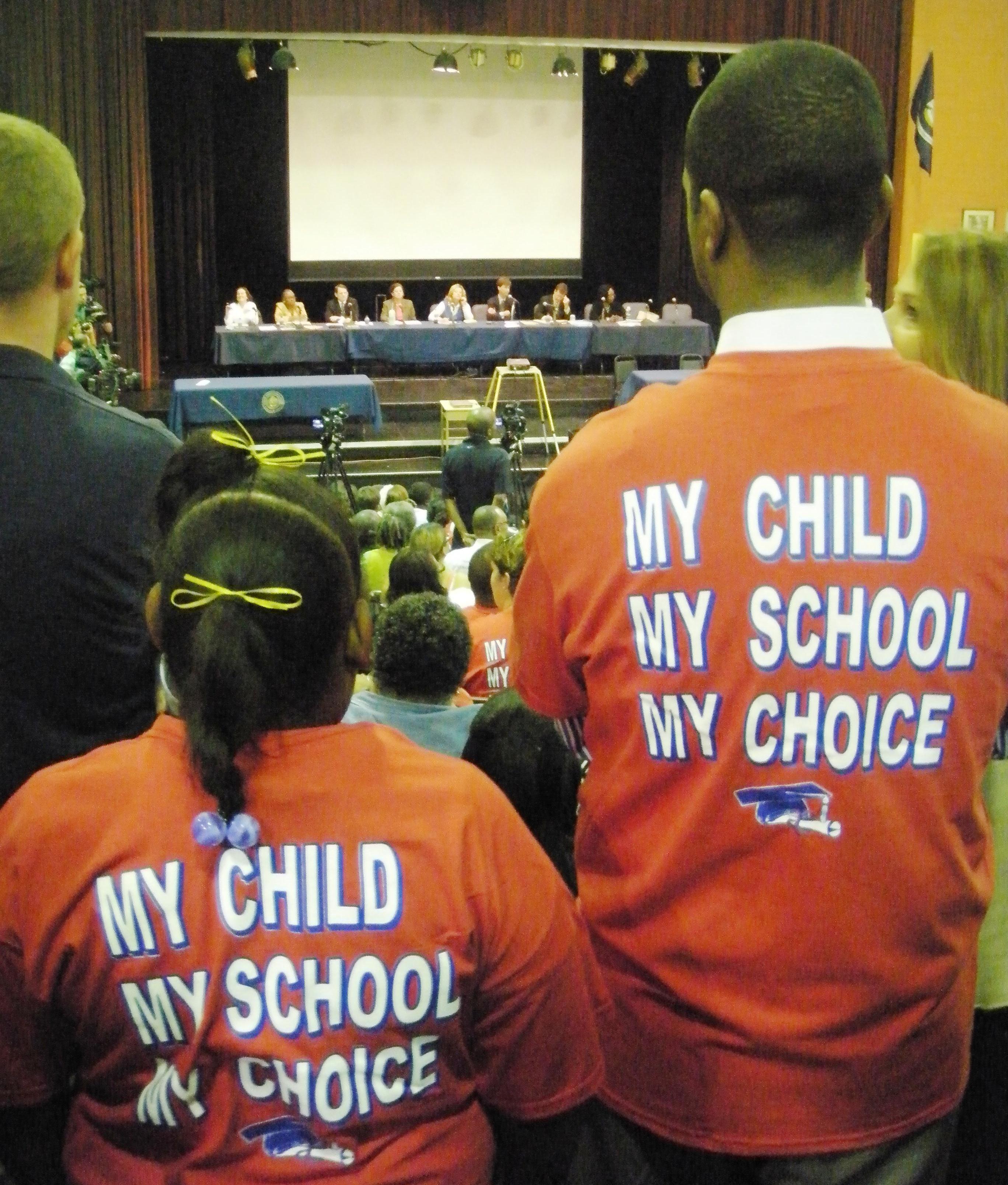
Emotions Run High Over Post-Katrina School Districting
Boisterous crowd debates future governance of New Orleans schools
NEW ORLEANS – On Thursday night more than 600 people gathered at McDonogh #35 High School to debate whether and how the Recovery School District’s 68 schools ought to return to Orleans Parish School Board control. Over 80 people testified on State Superintendent Paul Pastorek’s transfer plan in an environment that was divisive and racially charged.
The standing-room-only audience (pictured above) – approximately 200 people had to be turned away – was testament to the contentiousness of school governance in post-Katrina New Orleans. For more than three hours, attendees heard a range of conflicting assertions regarding the success or failure and legality of the Recovery School District versus the Orleans Parish School Board.
The key issue up for debate was Pastorek’s recommendation that some RSD schools, after five years under state control, have the option to return to the local OPSB. Such schools would need to reach “an acceptable academic level and [be] on a stable and upward course for academic success.” Within the RSD, charter school boards and parents and staff of conventional government schools could then vote to return to OPSB. The state’s Board of Elementary and Secondary Education would then give final approval, with stipulations, for transfer.
Responses were broadly divided between calls for an immediate return of all RSD schools to the OPSB and calls for an across-the-board renewal of the five-year program. Each faction gave raucous applause, contrary to the wishes of Chas Roemer, the evening’s moderator and BESE board member, and almost all speakers went over their allotted 90 seconds.
Pastorek witnessed a “deeper level of expression” of the sentiment in the community, although they were primarily “ideas I had already heard.” He recognized that “people have developed a certain confidence about the way things have worked in the RSD, and they don’t have that same confidence about the OPSB. I think that’s one of the big challenges.”
Those in favor of a swift return asserted that the RSD, if continued, will be illegal and contrary to the state’s constitution; it would run against the tradition of local control of schools; it would perpetuate a profit-oriented approach to education; and it would favor charter schools that lack universal admission, particularly with special needs children. Members of the OPSB also asserted that they had moved beyond the regrettable legacies of financial malfeasance and resistance to reform and charter schools.
“Our position is that the RSD report to BESE represents a constitutional deviation,” said Harry Rosenberg, OPSB’s attorney. “The constitution of Louisiana provides that school structure should be based upon local control – that is parish control.” In his view the legislature only allowed the RSD for the limited purpose of saving failing schools. Therefore, “schools that are clearly not failing now should be returned to local control.”
Pastorek’s plan does define failing and would allow non-failing schools to return. However, that choice would be for the schools and BESE, so the transfer would not be automatic.
Jennifer Blalock, a teacher with Hope Academy of Booker T Washington High School, asserted that the RSD is a haven for charter schools, which she sees as “privatization… schools for profit. Katrina presented an opportunity for entrepreneurs, for capitalists,” and if the RSD continues “they’ll all become charter schools.” She believes that the OPSB has different priorities and will not allow that. She acknowledges that charter schools are “great, and they have their place,” but she is concerned that they don’t have to take everybody and have disproportionate impacts. “They change the names of schools and disconnect African Americans with their heritage and their history.”
The speakers, however, were not split cleanly along racial or partisan lines, and many African Americans spoke in favor of the current districting. One such student took the platform and shared his success story with a new charter school. “Superintendent Pastorek, you’re my brother!” In addition, a representative from the Orleans Parish Republican Executive Committee advocated an immediate return of all schools to the parish.

Proponents of RSD retention included many parents and students associated with RSD schools, particularly the charter variety. They welcome educational entrepreneurs, and they see a return to the OPSB as a threat to their autonomy and ability to innovate. A former OPSB superintendant, Barbara Ferguson, was in attendance, and she highlighted the OPSB’s resistance to site based management. Under the current format, she would “never” let the schools back into the OPSB.
“I believe in local control, but they need to allow for site based management. When I was the superintendent I tried to get the board to allow the local schools to have a little more autonomy, to control their funds… But the OPSB gets so much money for so many students; they wanted to handle the contracts, purchase the curriculums… The school board likes to control all the funds, and as a superintendent I could never get the school board to loosen that and let the funds be controlled at the site level.”
T.K. Lewis, a mother whose child attends Sophie B. Wright Charter School, shared her positive experience, particularly regarding parental involvement and staff responsiveness. She does not want the OPSB “to take over the charter schools.” She contests the idea that the OPSB is responsive to the needs of the people, and she does not see the state intervening in charter school innovation.
Educate Now!, a reform-oriented New Orleans non-profit organization, released materials at the event to refute five popular misconceptions regarding the post-Katrina educational landscape. For example, while many speakers asserted that RSD charter schools are not accepting students with disabilities, Educate Now! points out that 9 percent of students in both RSD and OPSB schools were special needs, and four RSD charter schools have more than 10 percent students with disabilities.
Tara Kennedy, a parent of an autistic child, also disputed the notion that she had been mistreated by the RSD. She believes that such cases are illegal and not limited to charter schools.
“It is both inaccurate and irresponsible to dump that heap on them. Putting all charter schools back under the auspices of the OPSB is not a magic bullet, and putting the state into every school’s special education program is not the answer.”
While not taking a position one way or the other, the Cowen Institute, an education think tank at Tulane University, believes Pastorek’s proposal is a new concept that “will potentially lead to confusion.” They request that the state, if it is to proceed with the RSD as a permanent home for schools, prepare a strategic plan for how to address the schools that are still low-performing.
The original five-year time frame for the RSD expires at the end of the 2010-2011 school year. BESE will make a decision on Pastorek’s recommendation before the end of December 2010.
Fergus Hodgson is the capitol bureau reporter with the Pelican Institute for Public Policy. He can be contacted at fhodgson@pelicanpolicy.org, and one can follow him on twitter.






